Patagonia – The Story behind the Brand
On September 14, 2022, Yvon Chouinard, the founder of outdoor apparel and gear Patagonia made the news with a unique leadership and business decision: he donated his 3 billion US dollar company to a climate change organization effectively committing his business to protect Earth.
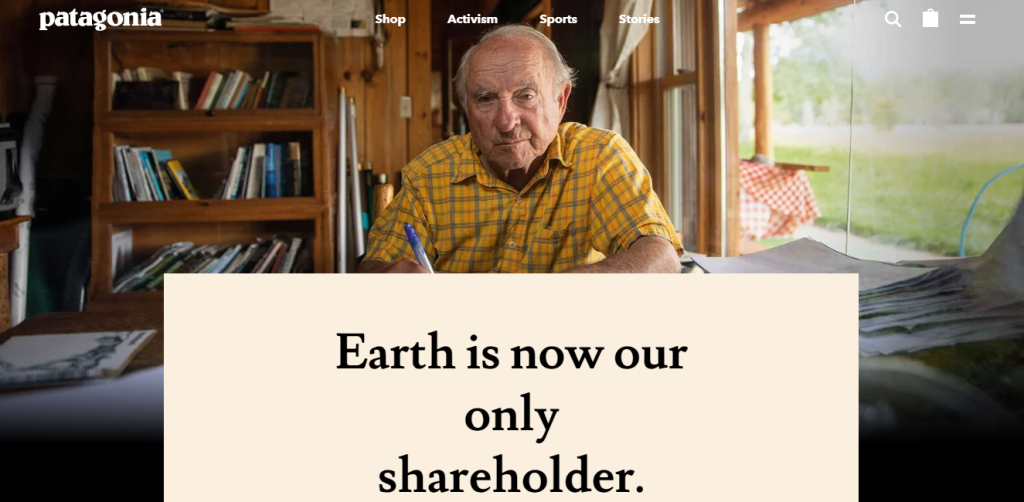
Patagonia.com’s landing page
Patagonia’s new owners are the Holdfast Collective and the Patagonia Purpose Trust.
Holdfast Collective is a not-for-profit organization; the organization receives funds to fight the environmental crisis, protect nature and biodiversity, and support thriving communities and decision-makers dedicated to building a better future for people and Earth.
The Patagonia Purpose Trust was created solely to protect the company’s values and mission. All excess profits—money the company makes after reinvesting in the business—will be distributed as a dividend to the Collective to be used for its work.
Truth be told, there were no good options available. So, we created our own.
Instead of “going public,” you could say we’re “going purpose.” Instead of extracting value from nature and transforming it into wealth for investors, we’ll use the wealth Patagonia creates to protect the source of all wealth.
Yvon Chouinard
With this decision, Yvon Chouinard has just redefined the meaning of going all-in business-wise. It’s also unprecedented: no other founder has donated their billion-dollar company to a non-profit organization no matter how strongly they supported its mission. When or if other business leaders follow his example, as he said he hoped, remains to be seen.
View this post on Instagram
Read on to discover Patagonia’s story behind the brand and how Yvon Chouinard has slowly changed the meaning of doing business.
Looking to learn about other purpose-driven companies running successful businesses? Click here and here.
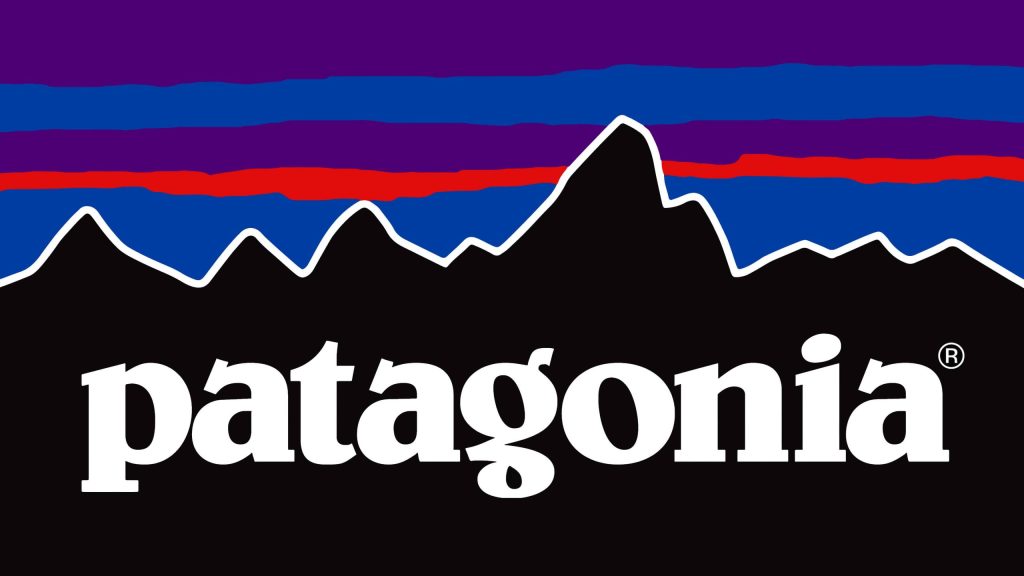
PATAGONIA – The Story behind the Brand
When Yvon Chouinard became an entrepreneur, almost fifty years ago, he didn’t imagine nor wished that one day he would become a billionaire. He wanted to make outdoor clothing and gear for his mountain climbing friends and himself.
The first money he ever made as a young entrepreneur, was selling steel pitons he made himself on an old forge. Encouraged by his success, he started Chouinard Equipment with a friend. Within nine years, Yvon and his partner had redesigned and improved almost every climbing tool.
The climbing gear produced by Chouinard catered to the needs of the climbing community: it was stronger, lighter, simpler and more functional. Unfortunately, it was also damaging the rock. To protect the mountains he loved so much, he decided to replace steel with aluminium.
The aluminium chocks were an innovation so the first step to market them to the climbing community was to show the climbers how to use them through printed essays in the company’s catalogues.
The chocks were an instant success and paved the way for the next innovation: the quick-drying insulated apparel and underwear. From this point on, the company began to make significant investments in the research and development of new and innovative fabrics.
As we began to witness the extent of global warming and ecological destruction, and our own contribution to it, Patagonia committed to using our company to change the way business was done.
If we could do the right thing while making enough to pay the bills, we could influence customers and other businesses, and maybe change the system along the way.
Yvon Chouinard
Over the next decades, the company, now known as Patagonia, has grown at a fast pace but maintained the community-centred culture that was there at the beginning. Employees dressed casually, played volleyball in the sandpit at the back of the company building, ate healthy, mostly organic food at the company’s cafeteria or had lunch with their children at the on-site childcare centre, among the first in the country at that time.
When you care about your people, you care about the environment; when you care about the environment, you care about people. One nurtures the other.
It’s been nearly 50 years since we began our experiment in responsible business, and we are just getting started. If we have any hope of a thriving planet—much less a thriving business—50 years from now, it is going to take all of us doing what we can with the resources we have. This is another way we’ve found to do our part.
Yvon Chouinard
The company’s shift towards protecting the environment continued naturally in the early 70s with its first contribution: to save the Ventura river and its fish habitat from a development plan. The donation was small but it made a difference: the difference between killing and saving a natural ecosystem.
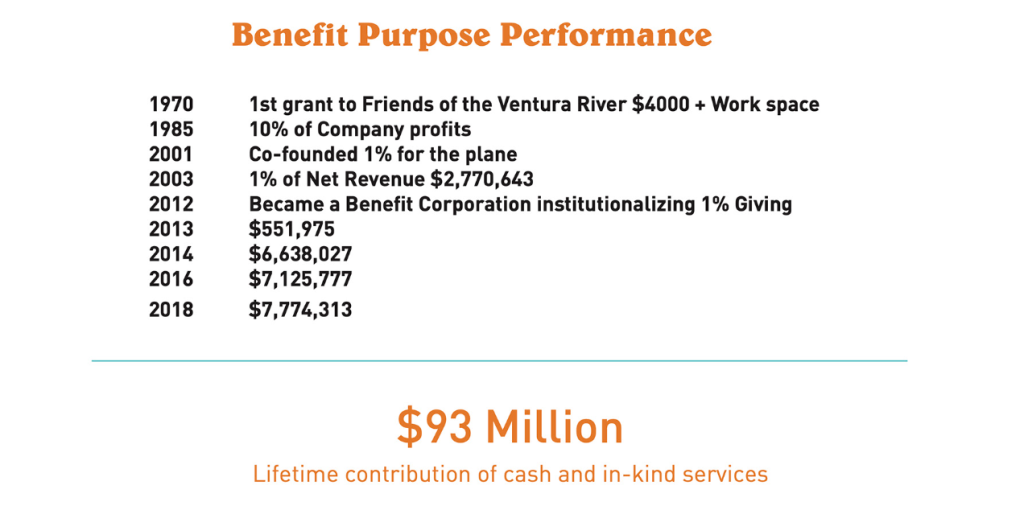
Excerpt from Patagonia’s Annual Report 2021
Yvon and his core team were inspired and began making regular donations to smaller groups working to save or restore habitats. They never donated to big NGOs acting very much like corporations; they always directed the money toward local grassroots organizations with an authentic passion for the environment.
Starting in 1985, Patagonia pledged 10% of its profit to conservation groups. They felt they weren’t bold enough so they took it one step further and committed 1% of sales, profit or not.
Entering a new decade, the company took steps to reduce the influence of its business on the environment and began using 100% organic cotton exclusively.
In 2011, they made a bold statement with their anti-consumerism Black Friday ad Don’t buy this jacket.
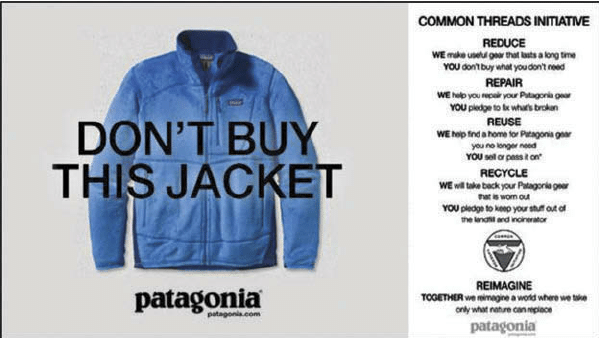
In 2012, Patagonia became a B-Corporation (B stands for “benefit”), a certification received by companies with an explicit social or environmental mission, and a legally binding fiduciary responsibility to take into account the interests of workers, the community and the environment as well as its shareholders. For 2022, Patagonia has been recognized as one of the Best For The World B Corps in Environment and Community (source).
In 2017, Patagonia sued President Trump following his proclamation to reduce the territory of Native American national monuments in Utah.
In 2018, the company’s mission changed to a very clear and simple statement: We’re in business to save our home planet. The company’s revenue for 2022 is estimated at 1.5 billion US dollars which goes to show that having a solid commitment to its brand-driven activism is also good for business. The company has built a strong community around
In 2020, the company launched a collection of Patagonia shorts with tags that said Vote the A**holes Out as a response to those politicians denying the reality of climate change but looking to get elected that year. It wasn’t a brand campaign, the media and the wider public found out about the message when a photo of the tag was posted on Twitter. Needless to say, the line sold out immediately and now they are a collector’s item.
Pure🔥by @patagonia. pic.twitter.com/PDCnHSqsjo
— Corey Ciorciari (@CoreyCiorciari) September 12, 2020
Now the company has taken the ultimate step toward fulfilling its brand mission: every dollar made that’s not reinvested back in the business goes to fund the work of the Holdfast Collective, namely around 100 million US dollars a year.
Patagonia is now at the stage where business equals the mission and the community. Through everything it does, the company gives a powerful voice to a community of millions worldwide and uses its resources to protect nature and secure a better future for our children.
Despite its immensity, the Earth’s resources are not infinite, and it’s clear we’ve exceeded its limits. But it’s also resilient. We can save our planet if we commit to it.
Yvon Chouinard
3 brands that prove authenticity in marketing is paramount
What is authenticity in marketing? Authenticity in marketing is brands creating marketing strategies that reflect their core values even if these strategies go against the norms or business standards.
Lingerie brand ThirdLove doesn’t feature slim supermodels to sell its bras, outdoor clothing company Patagonia asks its customers to buy less on Black Friday and ice cream maker Ben & Jerry’s calls upon everyone to dismantle white supremacy which prompted thousands of people to accuse the company of being anti-law enforcement.
ThirdLove – To all women everywhere, we see you and we hear you
Founded in 2013, Third Love is producing and selling bras and underwear.
The company was the first bra and underwear brand to offer trademarked half-cup sizing and a mobile app allowing women to measure themselves at home.
It all began with co-founder Heidi Zak’s frustration with lousy bras and bad fits. That’s when she decided to build her own bra thus Third Love was born.
Third Love celebrates diversity; it’s one of the company’s main core values and it reflects in their marketing.
Just as the company designs their bras with real women’s measurements, their marketing campaigns and overall online presence feature women of all shapes and sizes.
Such a difference from Victoria’s Secret! The luxury lingerie brand was once the leader of the underwear industry. By 2018, due to a combination of dated business approach, oversexualized images and heavy competition, the brand’s market share had begun to shrink from 31% in 2013 to 24%.
Also in 2018, Third Love had a run-in with Victoria’s Secret over the interview that the brand’s CTO gave to Vogue Magazine.
In this interview, he basically said that Victoria’s Secret supports the woman as long as she portrays herself as the object of the heterosexual white male’s fantasies.
He also hinted toward Third Love by saying “We’re nobody’s ThirdLove, we’re their first love.” This prompted Heidi Zak’s reaction in the form of a full-page open letter published in the New York Times where she writes:
As you said Ed, “We’re nobody’s ThirdLove, we’re their first love.” We are flattered for the mention, but let me be clear: we may not have been a woman’s first love but we will be her last.
To all women everywhere, we see you, and we hear you. Your reality is enough. To each, her own.
View this post on Instagram
Patagonia – We’re in business to save our home planet
Patagonia is a clothing company that markets and sells outdoor clothing.
The company was founded by Yvon Chouinard in 1973 and considers itself an “activist company”. They’re in business to save our home planet and will use every resource at their disposal – their voice, business and community to solve the climate crisis.
The brand talks the talk and walks the walk. The company has a self-imposed Earth tax, 1% for the Planet, which it uses to provide support to environmental nonprofits working to defend air, land and water around the globe.
Since 1985, when Patagonia took this pledge, the company has donated over $89 million in cash. In 2019, it is estimated that the company had $800 million in revenues.
Patagonia is followed by almost 1,8 million people on Facebook and 4,6 million on Instagram. They are building a strong community online and offline.
The company’s marketing strategy is to support its activist-led campaigns (like the company’s anti-Black Friday ad Don’t buy this jacket). To achieve this goal, Patagonia uses storytelling to turn consumers into activists. Its online presence features only a few scattered sales posts.

Ben & Jerry’s – Democracy is in your hands
Ben & Jerry’s manufactures ice cream.
It was founded in 1978 by Ben Cohen and Jerry Greenfield, hence the company name.
The company’s mission is to create prosperity for everyone that’s connected to its business: suppliers, employees, farmers, franchisees, customers, and neighbours alike.
They care about a wide range of issues from racial justice to fairtrade, democracy to LGBT equality.
Why does an ice cream maker care about political and social issues?
In an HBR piece published earlier this year, Ben&Jerry’s CEO Matthew McCarthy answered this when asked about the company’s core commitment to speak out on issues they feel strongly about:
We do these things not to sell more ice cream but because we care about people and have values. All businesses are collections of people with values; it’s a force that’s always there. {…} I believe that increasingly, in a world of hyper-transparency, if you’re not making your values known publicly, you’re putting your business and brand at risk.
The latest reports on consumer behaviour are highlighting that fact that most consumers (86%) want brands to take a stand on social issues and they would also purchase a product because a company advocated for an issue they cared about (87%).
What consumers are asking brands today is not what do you stand for but what do you stand up for?
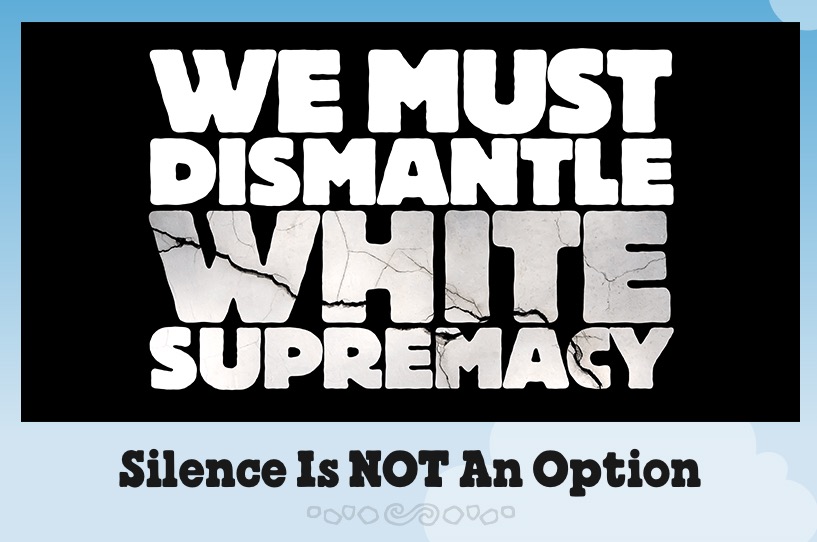
Here is Matthew McCarthy’s recommendation for companies looking to make activism part of their core values:
If you don’t know what you want to do, talk to your staff, get people together, create the space for this discussion around values. You could decide that your thing will be The Humane Society. It could be packing lunches. It can be anything. What it can’t be is nothing.
Join the Conversation
We’d love to hear what you have to say.
Get in touch with us on our LinkedIn Page, Facebook Page, Twitter or TikTok.
When Authenticity is Your Brand’s ….Brand
Is your brand authentic? Is it true to its values and does it express them truthfully?
Read on to discover three brands whose names are synonymous with authenticity.
In today’s consumer-driven environment, brands that are authentic and true to their values earn their customers’ trust and increase their business. According to various reports, a great majority of customers around the world expects brands to be honest and authentic.
Let’s see how three brands express authenticity when talking to their customers!
1. Aviation Gin / The Process
In February 2018, Ryan Reynolds, the Hollywood star famously known for his Deadpool movies acquired Aviation Gin, an American boutique gin distillery. While he stated he won’t be involved in the gin-making process, he assured his shareholders and the customers that he will have a say in the marketing, sales and distribution processes. I can’t express any opinions regarding sales and distribution, but I must say it would have been a surprise if he didn’t get involved in the marketing and advertising of his new spirited company. After all, he knows a thing or two about creating buzz and earning brand awareness – Deadpool campaigns are lessons in advertising virality that every advertising professional should study.
If you follow Ryan Reynolds on social media, you are already familiar with his dry sense of humour. His Deadpool character is an extension of Ryan’s personality: the same tongue-in-cheek witty but kind humour.
Aviation Gin is no exception: the brand’s communication style is all Ryan. He stays true to himself and this translates into brand authenticity.
In this ad, Ryan takes a less traditional approach to the standard How it’s done video essentially poking fun at other spirits producers.
The ad is nominated for the People’s Voice 2019 Webby Awards in the Video Ad Longform category. You can vote for it here.
2. The Dollar Shave Club.com / Our Blades Are F***ing Great
Dollar Shave Club is an American company that delivers razors and other personal grooming products to customers by mail on a monthly basis. The company was founded in 2011 by Mark Levine and Michael Dubin after expressing their frustrations with the cost of razor blades.
In 2012 the company uploaded on its YouTube channel a video entitled Our Blades Are F***ing Great featuring CEO Michael Dubin. In this video, Michael talks about his company’s service in a nonchalant and sarcastic manner. No expensive interiors, no dreamy locations, nothing fancy just himself talking in his warehouse.
The video is straight to the point and highly authentic; it prompted 12,000 orders in a two-day span after it was released, and has received over 26 million views to date.
The video won “Best Out-of-Nowhere Video Campaign” at the 2012 AdAge Viral Video Awards and the 2013 People’s Choice Webby Award in the Fashion & Beauty category.
3. Patagonia – Artifishal / The fight to save wild salmon
Patagonia is an American clothing company that markets and sells outdoor clothing. The company was founded in 1976 by Yvon Chouinard, an accomplished rock climber.
Patagonia is an activist company which commits 1% of its annual net revenue to nonprofit charity organizations focused on conservation and sustainability. But the company does more than support these organizations financially.
Over the years Patagonia has built a strong community of activists and acted upon its mission: to save our home planet.
Here is the company’s campaign to fight for the future of wild salmon and the environment that supports this fish.
Join the Conversation
We’d love to hear what you have to say.
Get in touch with us on Facebook Group and Twitter.

